| Srl | Item |
| 1 |
ID:
095262
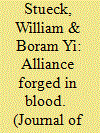

|
|
|
|
|
| Publication |
2010.
|
| Summary/Abstract |
The US occupation of Korea from 1945 to 1948 was not notable for its success. The volatile interaction between the occupiers and the occupied provided an important context for its relatively rapid conclusion and for Washington's ineffective employment of deterrence in the lead-up to the June 1950 North Korean attack on South Korea. This essay describes the volatile interaction between Americans and Koreans on the peninsula and the circumstantial, psychological, and cultural factors behind it. The essay concludes by analyzing the psychological impact of the Korean War on the relationship and how this and later cultural changes have made possible an enduring alliance between the United States and the Republic of Korea.
|
|
|
|
|
|
|
|
|
|
|
|
|
|
|
|
| 2 |
ID:
095266
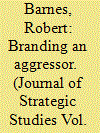

|
|
|
|
|
| Publication |
2010.
|
| Summary/Abstract |
The crisis following China's intervention in the Korean War led to a significant rift between the United States and the Commonwealth at the United Nations (UN). This article examines the conditions under which the Commonwealth became united and was able to directly influence UN decision-making. It concludes that, when united, the Commonwealth could not easily be ignored by Washington, and thereby acted as an agent of constraint upon the Western superpower.
|
|
|
|
|
|
|
|
|
|
|
|
|
|
|
|
| 3 |
ID:
095273
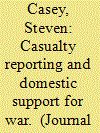

|
|
|
|
|
| Publication |
2010.
|
| Summary/Abstract |
The common argument that public support for war is casualty sensitive ignores the fact that casualty figures are not revealed automatically. While the military decides when, and to whom, to release such information, political elites can question, even condemn, how the government goes about this business. After briefly exploring how the US military operated during the two world wars, this article focuses on American casualty reporting during the Korean War, arguing that the way the figures were revealed often sparked enormous political controversy, which at two crucial moments helped to undermine domestic support for this distant war.
|
|
|
|
|
|
|
|
|
|
|
|
|
|
|
|
| 4 |
ID:
095264
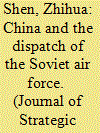

|
|
|
|
|
| Publication |
2010.
|
| Summary/Abstract |
China's entry into the Korean War, together with the involvement of the Soviet Air Force, constituted not only the base of Chinese and Soviet joint assistance to North Korea but also the formation of the Sino-Soviet-North Korean triangular alliance. Recently declassified Russian Defense Ministry archives show that Stalin wavered on dispatching the Soviet Air Force for fear of a direct confrontation with the US/UN forces. It was 12 days after Chinese troops entered the war that Stalin finally allowed the Soviet Air Force to provide air cover. New documents that shed light on this enormously significant historical process demonstrate that the Sino-Soviet-North Korean triangular relationship was extremely delicate and weak.
* An early version of this article was translated by Yang Jingxia and Douglas A. Stiffler, Juniata College. Yafeng Xia, Long Island University, molded the article to its final form.
|
|
|
|
|
|
|
|
|
|
|
|
|
|
|
|
| 5 |
ID:
095268
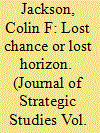

|
|
|
|
|
| Publication |
2010.
|
| Summary/Abstract |
This article examines three questions surrounding American attempts at war termination in 1951. Was there a militarily feasible 'lost chance' for UN forces to advance to the narrow neck of the Korean peninsula? If so, why did American decisionmakers decline to pursue it? What effect might such operations have had on the course of the war and subsequent American thinking on limited war? It concludes that the US missed a critical opportunity to conclude the war on more favorable terms; that the American decision to forgo amphibious operations in June 1951 had less to do with military calculations than with the domestic political firestorm that followed MacArthur's relief; and that the 'lost chance' not only increased the cost and duration of the Korean War, but encouraged subsequent decision makers to overstate the risks of intra-war escalation and understate the risks of premature, de-escalation.
|
|
|
|
|
|
|
|
|
|
|
|
|
|
|
|
| 6 |
ID:
095275


|
|
|
|
|
| Publication |
2010.
|
| Summary/Abstract |
Despite recent attention, the Korean War (1950-53) remains underappreciated and further explanation of its 'forgottenness' is needed. Korea originally faded to gray because there was no satisfying victory. National security planners had ample reason to try and rehabilitate the war in the mind of the public, but had little success. This was because a primary accomplishment of the second half of the war - forcing the enemy to accept so-called voluntary repatriation of POWs (prisoners of war) - was semi-secret and never declared as a major war aim. Since the nation was never united around securing voluntary repatriation, there was little raw material for creating a memory of success.
|
|
|
|
|
|
|
|
|
|
|
|
|
|
|
|